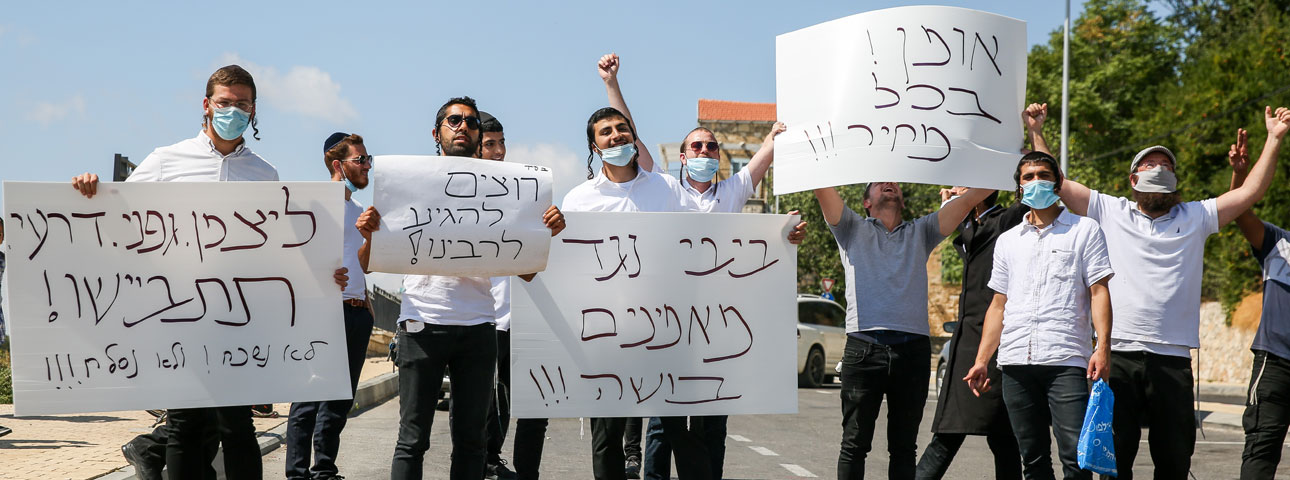Haredim Lose Faith in their Political Parties
Ultra-Orthodox communities have been very critical of their political leaders for not advocating vigorously enough on their behalf at the beginning of the COVID crisis. Now, the ultra-Orthodox parties are at the forefront of the contentious demand to permit mass travel to Uman.

Flash 90
Dr. Gilad Malach, Director of the Ultra-Orthodox in Israel program at the Israel Democracy Institute, on the dispute with regard to the annual pilgrimage to Uman:
“The annual pilgrimage to Uman is the most significant event on the calendar of the Breslav Hassidic sect and of the many Jews who identify with elements of this sect. In an average year, about 30,000 people travel to Uman during Rosh Hashanah and the High holidays to pray and prostrate themselves on the grave of Rabbi Nachman of Breslav. Due to the pandemic, mass travel to a densely populated event is deemed unacceptable by all health officials, due to the fear of a spike in corona cases upon their return to Israel.
So why did turn into a political crisis? Ultra-Orthodox political leaders have been sharply criticized by their constituencies, who claim that in the first months of the COVID-19 outbreak, they aligned themselves with the Ministry of Health's directives and did not advocate vigorously enough on behalf of the interests of the ultra-Orthodox public, and insist that synagogues and yeshivas remain open. This criticism lies at the base of the now increasingly contentious struggle of the ultra-Orthodox parties to permit mass travel to Uman."
A new survey by the Israel Democracy Institute, conducted among a representative sample of ultra-Orthodox men, ages 18-30, examined the impact of the corona crisis on the ultra-Orthodox community’s trust in their political leadership and in other institutions. Findings indicate that less than a third of ultra-Orthodox Israelis believe that their communities' trust in the political parties that represent them has not been harmed by the coronavirus crisis (32%). 38.5% think that their trust in ultra-Orthodox parties has been 'harmed' or 'harmed to a great extent.' The ultra-Orthodox politicians are apparently aware of this deterioration in public trust, and therefore have stepped up their advocacy for the positions supported by their communities, even in instances when it is clear that these are liable to endanger public health.
Dr. Malach added: “A possible solution to the challenges related to this year's New Year's festivities could be a symbolic gesture to allow a select group of rabbis and community leadership to travel to Uman, while ensuring that they adhere to health rules. Such arrangements were successfully implemented in May, when similar ceremonies were held at the sacred site of Meron during the Lag B’Omer holiday.”
To what extent was the ultra-Orthodox community’s trust in ultra-Orthodox political parties harmed by the corona virus?
To what extent was the ultra-Orthodox (Haredi) community’s trust in various institutions harmed by the corona virus (%, total sample)
Ultra-Orthodox trust in various institutions was harmed/harmed to a great extent due to the corona virus – % who agree by ultra-Orthodox stream (%, total sample, by ultra-Orthodox stream)
The survey was prepared by the Guttman Center for Public Opinion and Policy Research of the Israel Democracy Institute. In the survey, which was conducted by telephone from August 11-17, 2020, included a representative sample of 773 ultra-Orthodox men aged 18-30. The maximum sampling error for the entire sample was 3.7%± at a confidence level of 95%.
The fieldwork was done by "Askria", which specializes in the ultra-Orthodox public.
